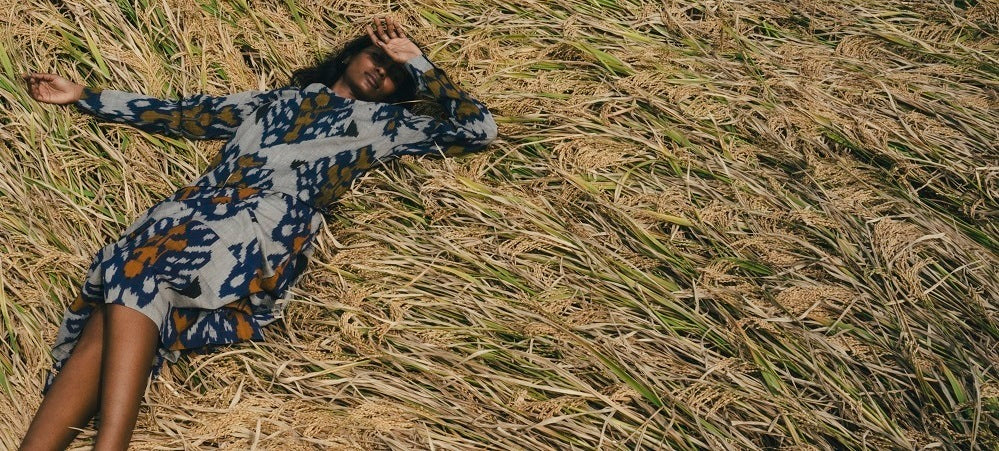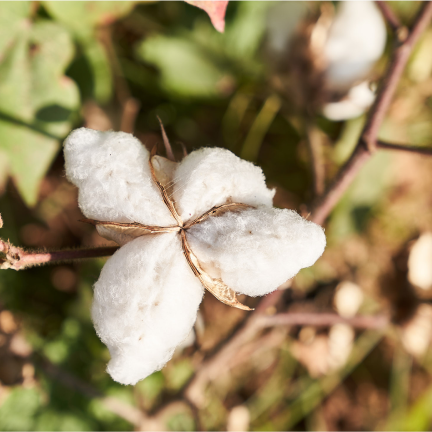Kritihika, 22 supervises the farm workers, and oversees the important work of treating the cotton seed, preparing the compost and other key elements essential to the overall regenerative aspect of farming. Her work also involves working closely with the farmers, inspecting crops for pests and any problems with the crops so a remedy can be found before it spreads. Before joining Oshadi, she trained at Erode for a B.Sc in Agriculture.
What time does your day start?
I wake up at 6 am and get ready for the office. At 6.40 I will eat breakfast at the hostel. Usually I leave my hostel at 7 am and take the government bus to reach the office at 8 am. I live in a women’s hostel, my family - my mum a tailor and my dad a cutting master - live a 1 hour drive from Erode. It is normal in Tamil Nadu to live in a hostel for working women which is safer than living alone in a rental home.
How do you start your day?
I will open the farm office and I will check the farm labourers' attendance and give them work which we have planned the previous day. This work I do when I stay at the farm where we prepare fertilisers and compost. On the days when I visit other farms I leave at 8.10 to go to another farmer’s field.
What is your role at Oshadi?
I supervise the farm labours who are working on the farm. Depending on the cotton season we do seed treatment, compost preparation, etc.
I work with the farmers and tell them what I have observed in their field regarding any pests or deficiency. I also write a note and give it to the farmer for issues in their field and its remedy.
I also make a consolidated report at the end of the day with all farmers field visits and the report is submitted to the head office.
What is your background/training?
B.Sc Agriculture in Erode. Previously I worked at a farmer producer company in Perundurai as field officer for 10 months after my graduation. Then I joined Oshadi in 2024.
How many farmers do you work with? How often do you visit each one?
I work with 77 farmers, visiting weekly once each farmer’s land. I stay in contact with all the farmers and call them 3 times a week.
How do you travel from farm to farm, how far apart are they?
I travel from farm to farm by a Scooter provided by Oshadi. Usually I go to farms zone by zone. There are three zones depending on the region in Erode. Each farm in one zone is 2 to 8km away from each other.
What are you analysing in the field right now?
Soil type, irrigation frequency, stage of plants, weeds, pest, disease, deficiency. It’s important to check if they applied the previous compost or pest repellent we gave them properly. Any other external factor affecting the field.

What challenges do the farmers face?
Due to rain the farm activities planned by farmers like spraying, weeding or compost application may be delayed. If the seeds don’t germinate properly they have to sow seeds in the gap and this will result in irregular harvest at the end.
Weeding might be delayed because they might not find the farm labours at the right time, so the weeds grow taller than the cotton crop in some cases.
What pests and diseases are you looking for?
In diseases I look for alternaria leaf blight, powdery mildew, Cercospora leaf spot.
In pests I check for sucking pest, red cotton bug, mealy bug, during cotton harvest dusky cotton bug, cotton bollworm, stem borer, root rot. We distribute herbal pest repellents made in the Oshadi farm to all our farmers such as Agniastra, five leaf extract and neem extract.
We also use trap crops like castor to prevent the pest attack in cotton.
Does the soil quality differ farm to farm? If so, how and why?
Yes the soil quality differs farm to farm, as farmers might have used chemicals in previous years and the soil texture will become hard. If farmers are not using chemical fertilisers we can identify the soil texture is soft and porous, so seed germination is fast.
In fields that use chemical fertiliser the pest attack is more, organic fields have more pollinators like bees.
What sort of things can you measure in the soil?
Nitrogen, phosphorus , potassium, calcium, and other macro and micro nutrients.I also collect samples of soil and water and send them to testing labs to find these parameters.
How important is data in building a regenerative seed to sew supply chain? How can it help?
When we do soil test we can find the nutrients in soil and recommend the correct dosage of compost. Using the field report I will also analyse if any farm has more pest occurrence why it is happening.
With harvest data I try to analyse why they got more yield or less yield. This will show if the farmer has maintained the field properly or not.
How does your work support the farmers in the field?
As we are following regularly they are getting good yield at the end of the season.
In previous years they might have followed different methods. Now I suggest a few changes in farming to get a good yield.
They are not aware of organic remedies for the pest because they are used to chemicals, I will suggest the natural pest repellants and organic compost suitable for their farm.
What do you like most about your job?
Always I wanted to create awareness on organic farming, I have studied only organic theoretically but I got the chance to see practically how to do organic. I also learn a lot through this work so I can convey the information to the farmer. As a person who has just started my career I am able to learn basics hands on.
Hobby?
Listening to music, handicraft - i made home decoration - wall hanging, incense stick stand. I was a football player at college.
Favourite food?
Ragi kali with ground nut chutney and ice cream.












